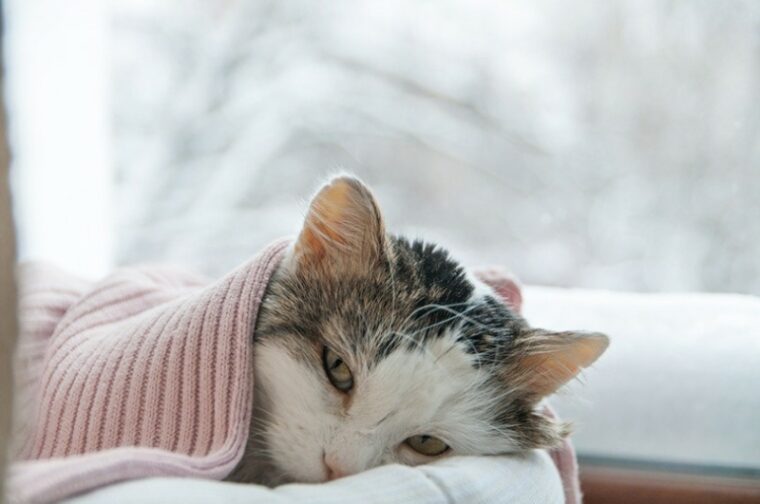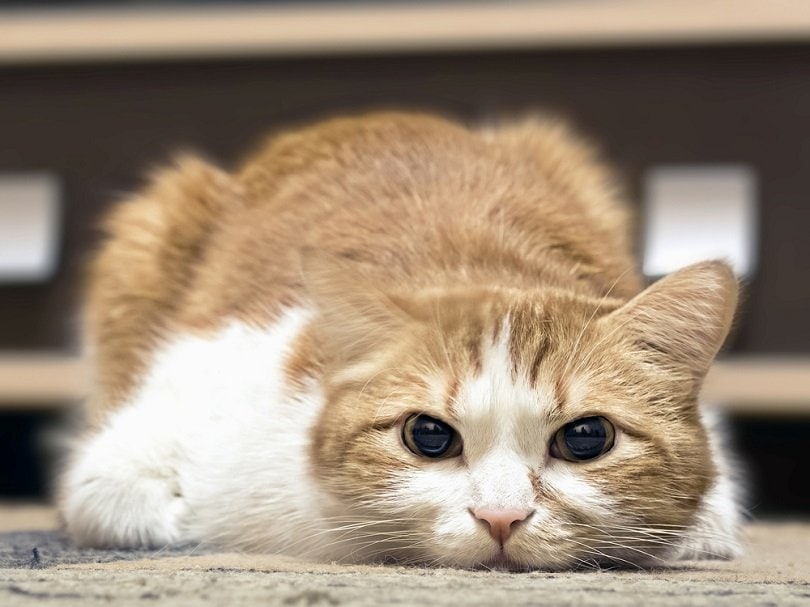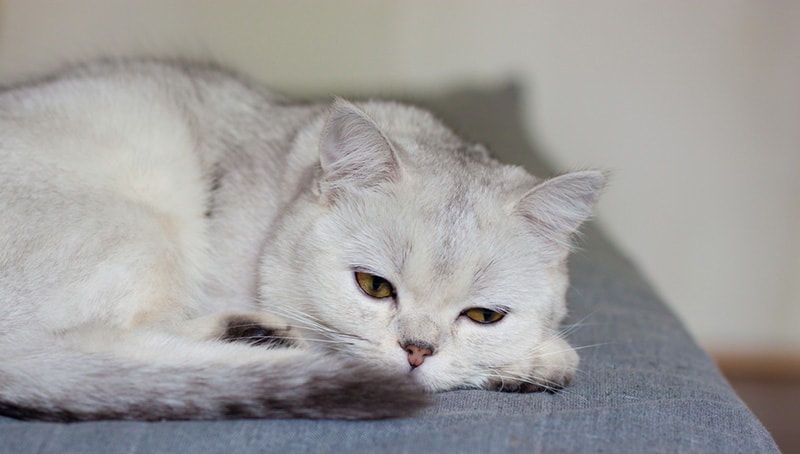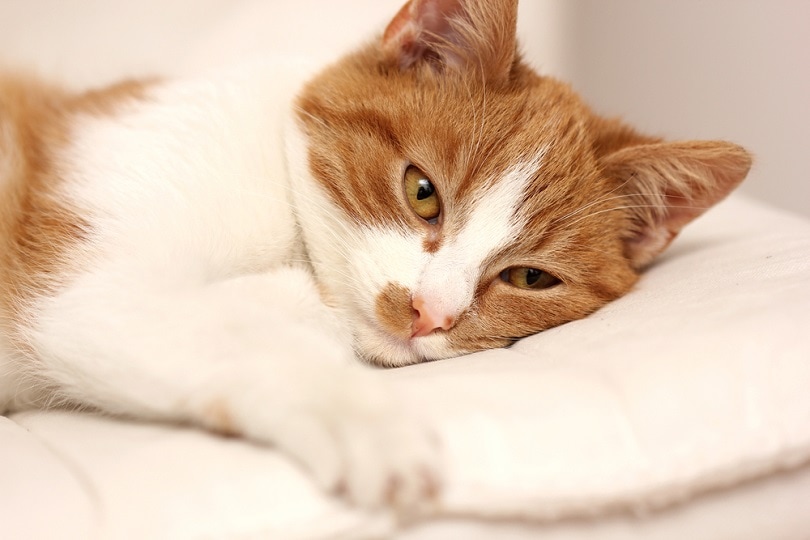
Click to Skip Ahead
Anemia is the word for a low red blood cell count. Anemia can occur in cats due to blood loss, decreased production of blood cells, or even destruction of the red blood cells. Oftentimes, anemia in cats is secondary to a more serious underlying condition and/or disease. In this article we will talk about some of the most common causes of anemia, what the abnormal signs are, and how to care for a cat with anemia.
What Is Anemia?
Anemia is the term referring to a low red blood cell count. Red blood cells originate in the bone marrow and then are circulated to every part of the body by the cat’s circulatory system. Red blood cells are responsible for many functions in the body. One of the most important is carrying oxygen to all of the organs. Anemia is the generic term for a decreased circulating red blood cell count, but it does not designate a cause to the anemia.
In general, a cat can have “non-regenerative anemia” and “regenerative anemia”. Non-regenerative means that the body cannot physically make appropriate amounts of red blood cells. Regenerative anemia means that the cat’s body should have the ability to regenerate and create the appropriate amount of red blood cells for survival.

What Are the Signs of Anemia in Cats?
Depending on the cause, your cat may have acute or chronic, regenerative or non-regenerative anemia. It’s important to note that the abnormal signs your cat may have will vary depending on how long the anemia has been present. If a cat has acute anemia, or anemia that has only developed within hours to weeks, you may notice the following signs: pale gums and/or tongue, collapse, increased respiratory rate, increased respiratory effort, and severe weakness. You may notice fresh blood in your cat’s urine or feces, or your cat may be coughing and/or vomiting up fresh blood as well. Sometimes your cat will have a visible, bleeding wound or a distended abdomen.
If your cat has chronic anemia, or anemia that has been present for weeks to even years, you may notice the following signs: pale gums and/or tongue, progressively increased respiratory rate and effort, increase in lethargy, weakness, anorexia, vomiting, dull mentation, and yellowing of the eyes/gums/mucous membranes. Your cat may have black colored stool (melena), brown or orange urine, and a dull coat.
One size does not fit all with anemia. Some cats will have the stereotypical abnormal signs, while others may have mild outward signs but severe anemia on bloodwork. Cats with chronic anemia have an amazing ability to act fairly normal until their red blood cell levels are critically low.
What Are the Causes of Anemia in Cats?
The causes of anemia fall under three large umbrellas: blood loss, red blood cell destruction, and lack of red blood cell production. With red blood cell loss, cats may become anemic from any type of trauma. This can include anything from getting hit by a car, to surgical blood loss, or even severe flea infestation Some other parasites such as intestinal hookworms can also cause significant blood loss anemia. If a cat has a tumor that ruptures, or starts to bleed, they can lose significant amounts of blood through the cancer. Some rodenticides will cause bleeding from a disruption to the cat’s clotting ability.
If your cat is anemic due to red blood cell destruction, this is commonly seen in cats from infectious causes. Both FeLV (Feline Leukemia Virus) and FIV (Feline Infectious Virus) can cause significant anemia as well as a blood parasite called Mycoplasma haemofelis (formerly known as Bartonella). Rarely we can see auto-immune disease in cats cause anemia.
Anemia secondary to decreased red blood cell production can also be seen with FeLV, FIV, and cancer. Lymphoma is a common cancer that can cause anemia in both dogs and cats. Cats can also get “anemia from chronic disease”, often seen in cats with chronic kidney disease and/or hyperthyroidism.

How Do I Care for a Cat With Anemia?
This entirely depends on the cause of the anemia. The first thing would be to treat the underlying cause. If your cat has severe fleas, an appropriate veterinary-prescribed flea prevention is recommended. If your cat has a parasite, different medications may be prescribed to treat the parasite. Unfortunately, if your cat is anemic from FeLV, FIV, or even cancer, there may or may not be many treatments available aside from a blood transfusion.
Blood transfusions can be performed but are often only done at emergency and/or specialty clinics. This is because cats have specific blood types that need to be determined prior to receiving a transfusion. If your cat receives a different donated blood than they themselves have, they will likely suffer an acute reaction and pass away.
It is never recommended to give your cat over-the-counter iron supplements or feed them red meat to increase their iron. Many OTC products can be toxic to cats and depending on the cause, your cat may not even benefit from increased iron. Anemia should always be managed by your veterinarian as treatment is case and cause dependent.
FAQ
How Is Anemia Diagnosed?
Anemia is diagnosed from bloodwork. There are then different tests to determine if your cat has FeLV, FIV, parasites, or cancer.
Will My Cat Die from Anemia?
If your cat’s red blood cell count gets low enough, yes, they will pass away. Red blood cells are responsible for carrying oxygen to all of the body’s organs. Without appropriate oxygen, the cells of these organs are unable to survive and ultimately your cat will pass away.

Can You Prevent Anemia in a Cat?
While you can’t prevent certain cancers, or even some immune-mediated disorders, you can help prevent other causes of anemia in your cat. Keep your cat on a veterinary-prescribed flea prevention, monitor regular fecal exams with your veterinarian, and de-worm if necessary. Testing your cat for FeLV and FIV will help you know if your cat has these diseases, and if they do not, they should stay inside to decrease any chance of exposure to infected cats and receive appropriate vaccines.
Conclusion
Anemia is classified as a low red blood cell count. It can be regenerative or non-regenerative, acute or chronic. There are many causes of anemia in cats such as infectious diseases, cancer, trauma, and kidney disease. Your cat may or may not show obvious abnormalities such as weakness, collapse, change in breathing, pale gums, and anorexia. Your veterinarian will want to determine the cause of your cat’s anemia so that they can best tailor treatment. Depending on the cause, the anemia may or may not be curable, with some cats requiring a blood transfusion. Unfortunately, if severe enough, some cats will die from anemia. However, other causes of anemia can be successfully treated and your cat will go on to live a normal, happy life.
Featured Image Credit: Germanova Antonina, Shutterstock







